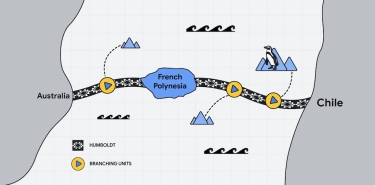The network protocols driving the Internet work on routing packets of data through many interconnected paths to get information from here to there. And while it works like magic, it's an amazing series of cables, satellites, radios, and more. Google and its partners in Chile and French Polynesia have announced a direct fibre optic network link across Asia Pacific to South America - the first ever to directly connect them - and when operational, Humboldt will strengthen the reliability and resilience of digital connectivity across the Pacific by interconnecting the cables that comprise the South Pacific Connect initiative and adding geographically diverse cable investments that link French Polynesia and Chile.
A direct fibre optic network link between South America and the Asia-Pacific region has been an ambition of the Chilean government since 2016, and Google says it is making it a reality.
"Chile is a country that is at the forefront of technology and is a leader in the implementation of the latest generation networks. As a Government, we are working day by day to consolidate this position and create the conditions for new investments of this kind to continue to arrive. The interest of companies like Google shows that Chile is doing things right. The country is leveraging its potential to generate the growth that will help us improve the well-being and quality of life of the people. These are projects that create employment and later, when they become a reality, improve the working conditions of thousands of people, in addition to placing Chile as a leader in the region and strengthening its position as the gateway from South America to the digital world," said Chile transport and telecommunications minister Juan Carlos Muñoz.
|
|
“Australia welcomes this new trans-Pacific cable connecting Australia and Latin America for the first time, supporting the growth of digital and economic ties. This new cable route will enhance Australia’s global connectivity and complement our work with Pacific countries to secure better access to the global digital economy,” said Australia minister for communications Hon Michelle Rowland.
"Economic vitality in my country relies on investments in the digital sector. We are thrilled to collaborate on the Humboldt project to continue advancing French Polynesia’s digital economy and keep Tahiti on the cutting edge of innovation," said French Polynesia president Moetai Brotherson.
The Humboldt project is the latest in Google's digital infrastructure investments across Latin America and will join other infrastructure projects including the Google data centre in Quilicura in powering Google services, the Google Cloud region in Santiago supporting customers across Latin America, the cross-Andes terrestrial connectivity between Chile and Argentina, and the Curie subsea cable linking Chile, Panama, and the West Coast of the United States.
Improving international connectivity helps drive economic growth in terms of gross domestic product (GDP) and job creation, while greater network capacity and lower latency enable businesses and public sector organisations to deliver better digital experiences to their customers and constituents, and people can gain skills and knowledge that open new career paths. The benefits can be realised in Australia, as well as within Chile and French Polynesia.
“This marks a significant milestone for the flagship project, the Humboldt submarine cable. After years of dedicated work, we are now entering the materialisation phase. Google, our esteemed international partner, ensures that these works will adhere to the highest technical standards. Our goal is to position Chile as a global digital hub, seamlessly connecting countries in the region with the Asia-Pacific. This achievement underscores the instrumental role of Desarrollo País' public-private partnership model in fostering Chile's growth,” said Desarrollo País general manager Patricio Rey Sommer.
The Humboldt cable is named for Alexander von Humboldt, a German polymath, geographer, naturalist and explorer who travelled extensively to the Americas at the turn of the 19th century. The moniker was selected by Chilean residents, who voted via social media in a naming contest organised by Desarrollo País and Chile’s Undersecretary of Telecommunications (Subtel). Chileans already share a special connection to the Humboldt project, and Google says it is excited to work with partners to bring it to life.













































